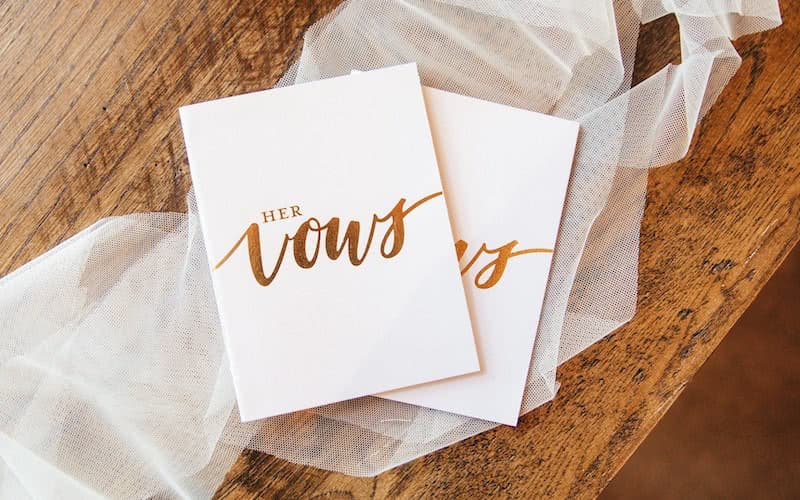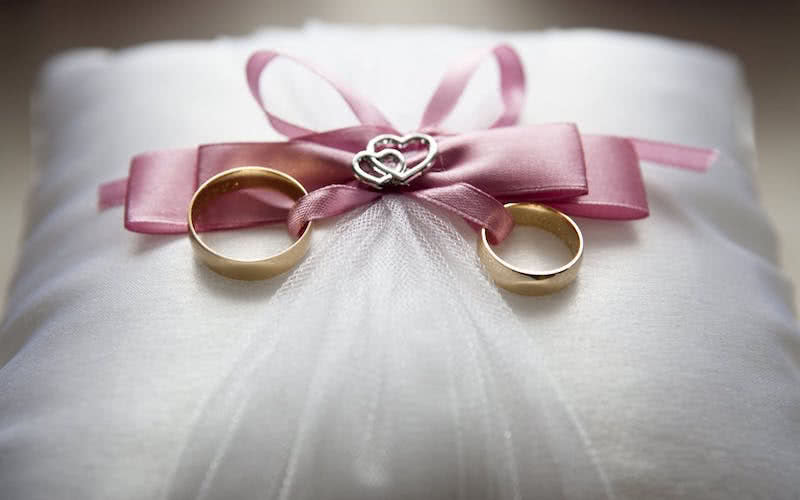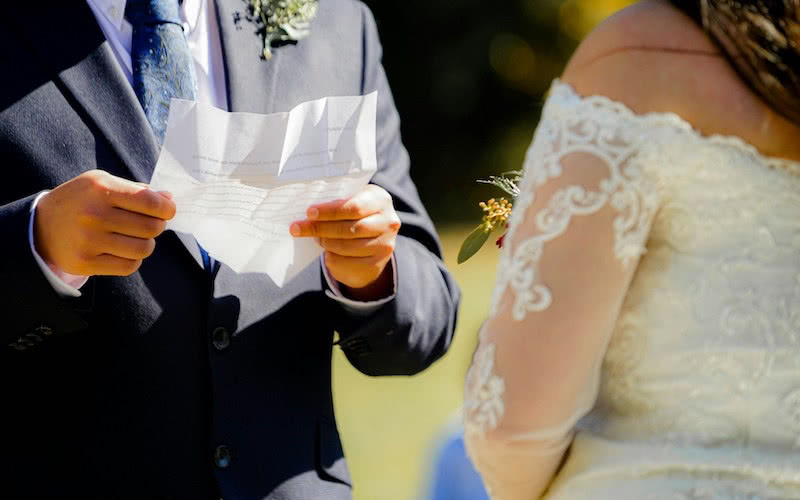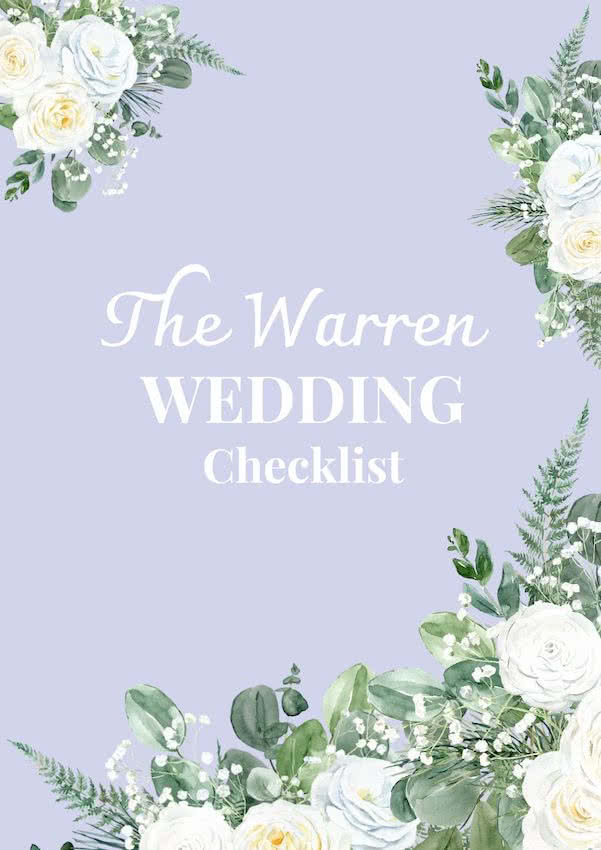Civil ceremony vows are the personal commitments partners make to each other, embodying their intentions and promises for their shared life ahead.
As the temporary madness of wedding planning unfolds, you may want to take some time to consider if you would like to say a few personal words as part of your vows.
Civil Ceremony vs Religious Wedding Ceremony
Although civil and religious ceremonies differ fundamentally in their setting and content, both share the objective of binding the couple in a loving, committed relationship.
Civil ceremonies are held at approved venues whilst religious ceremonies are held in churches or other places of worship.
The requirements for the vows differ too, and these differences highlight the diversity of options couples have to celebrate their union.
Traditional Wedding Vows
The main religious wedding vows in the UK are those of the Church of England and Catholic Church.
Religious vows carry a deep sense of tradition and are made by the faithful in the presence of God. In a church wedding, the solemn promises reflect a covenant not just between the couple but also with their faith.
Church of England Ceremony Vows
I [Full Name] take you [Full Name] to be my wife / husband, to have and to hold from this day forward, for better, for worse, for richer, for poorer, in sickness and in health, to love and to cherish, till death us do part, according to God’s holy law. In the presence of God, I make this vow.
Catholic Ceremony Vows
I [Full Name] take you [Full Name] for my lawful wife / husband, to have and to hold from this day forward, for better, for worse, for richer, for poorer, in sickness and in health, until death do us part.

What are Civil Wedding Vows?
Civil wedding vows are those exchanged during a non-religious, legally recognised marriage ceremony conducted by a civil registrar or other authorised official.
A civil ceremony strictly prohibits any religious content, texts, or divine promises, and is a secular affirmation between the husband and wife.
The Must-Have Wedding Vows for Civil Ceremonies
To be legally married, certain legal statements and declarations need to be made by the bride and groom, as prescribed by law of this country, to affirm their consent and commitment.
When the registrar asks, couples must confirm their intention to be joined in marriage in a a formal and public pledge in front of witnesses, and solemnly declare there is no lawful impediment to their being joined in matrimony.
This process is duly sanctioned under the law, signifying that the union is a solemn and binding contract voluntarily entered into for life.
Legal Declarations
I do solemnly declare, that I know not of any lawful impediment why I [Full Name] may not be joined in matrimony to [Full Name].
or
I declare that I know of no legal reason why I [Full Name] may not be joined in marriage to [Full Name].
Contracting Words
I call upon these persons here present to witness that I [Full Name] do take thee [Full Name] to be my lawful wedded wife / husband.
or
I [Full Name], take you [Full Name] to be my wedded wife / husband.
Following the legal declaration and contracting vows, personal promises and the exchanging wedding rings may occur.
Writing Your Own Vows
Writing your own civil marriage vows, or wedding ceremony promises, offers the opportunity to personalise your ceremony to reflect your individual relationship and journey.
They are not said instead of the legal declarations and contracting words, but in addition to them.

When deciding on wedding ideas, discuss with your registrar if you wish to add personal civil wedding vows to your ceremony.
How Many Civil Ceremony Vows Should I Have?
The number of wedding vows is a personal matter. Whether choosing to say a single promise each or a selection of vows, what matters most is that the unique and personal declarations genuinely represent the feelings and commitments to each other.
What Should I Say in My Marriage Vows? Ideas for Modern Wedding Vows
Couples often reflect on their journey, express commitments to helping their love grow, their mutual respect, and pledge trust and support in their vows.
How To Start Writing Vows?
There is no right or wrong when you personalise your wedding vows.
Many people choose to start with a statement of love, an anecdote, or an expression of gratitude towards their partner, to set the tone for the heartfelt promises that follow.
Here are some do’s and don’ts to crafting your marriage vows:
- Do make lots of notes of what you want to include – so you’ll have plenty to work with to refine the final version.
- Don’t leave it to the last minute – give yourself plenty of time before your wedding to start thinking about and writing your vows.
- Don’t be overwhelmed – break it up into smaller pieces. Research, planning, gather notes , then writing.
- Do look for inspiration in what others’ have done on Pinterest and online, to help decide your tone and style.
- Do ask your mum, sibling, or friend to be a sounding board and give you an honest opinion.
How Do You Make Your Vows Special?
Here are some tips when writing vows for marriages and civil partnerships to make them special for you.
Make it About Your Partner
Focusing on your partner highlights the personal nature of the vows. Affirming your love and promising to support each other in all endeavours makes them a bonding part of the ceremony.
Include Inside Jokes
Including inside jokes is a fun way to reflect the unique bond you have, and to entertain your guests, as well as each other!
Focus on Your Partnership
Discussing special aspects of your partnership in your vows emphasises shared values, and makes the ceremony a personal reflection of your relationship.
Reaffirm the Long-Term Commitment
A promise to stand by each other, to respect and cherish each other, through thick and thin, to support each other and face challenges hand-in-hand reflects a deep understanding that marriage is a journey. It’s about letting your partner know that you’re in it for the long haul, ready to navigate the ups and the downs together.
Include Partner’s Children
If either partner has children, acknowledging them in the vows can be a beautiful way to honour the blended family being created. Expressing a commitment to love and support these children as your own can be incredibly moving. It can help children feel valued and secure in the new family dynamic, reinforcing the idea that they are an integral part of this special day and the journey ahead.
Remember to Say, “I love you”
Amidst the excitement and formalities of a wedding, the simplest “I love you” is a powerful phrase. Woven into the fabric of heartfelt vows, theses words can resonate deeply. Beyond any promises or anecdotes shared, ending your vows with “I love you” serves as a reminder of the fundamental reason you’re standing there together.

Unique Wedding Vows Examples
Some examples of vows for wedding ceremonies include:
“With you, I have found my partner, my laughter, my eternal passion. I vow to nurture our love, so it continues to grow from this day forward.”
“As we stand together, I promise to support your dreams and respect our differences, to be your partner in all things, not possessing you, but working with you as a part of the whole.”
“Our journey has been like watching a series where every day is an episode filled with love, challenges, and laughter. I promise to watch the next episode with you, holding your hand, and facing whatever comes our way, together.”
“I vow not only to be your life partner but also a loving parent to your children, respecting them, and nurturing our new family’s bonds. Together, we will create a home filled with learning, laughter, and light.”
How to Ace the Delivery
The idea of delivering your wedding vows on the day in front of a crowd of your nearest and dearest can seem daunting.
To help ease anxiety, follow these tips:

- Rehearse aloud over the weeks before the wedding to become familiar with the flow and feel of the words.
- You don’t have to memorise them, it’s fine to read from a piece of paper.
- Before you start, take a deep breath to help calm any jitters.
- Focus on your partner and block out the others if that feels safer.
- Start with a smile, which will help relax you and your partner.
- Speak slowly and clearly, allowing your words to resonate with your partner and the audience.
Remember, everyone present is there to support you and share in your happiness, not to judge your performance anxiety.
FAQs
Are You Married if You Have a Civil Ceremony?
A civil wedding ceremony undertaken in an approved venue overseen by a licensed registrar is a legally binding marriage. This form of ceremony offers a secular alternative to religious weddings, focusing on the commitment between partners without religious context.
Do You Say Vows in a Civil Partnership?
In a civil partnership ceremony, partners may choose to exchange personal vows, though it is not a legal requirement. Exchanging personal promises can personalise your ceremony, making it more special by reflecting the emotional and personal commitment between the partners.
Who Reads their Vows First?
Traditionally, the groom reads his vows first, followed by the bride. However, you can adapt this to what suits you best.
Now On With The Celebration!
Once the formalities of the marriage or civil partnership ceremony are complete, with exchanging vows and exchanging rings done, it’s time for the celebration to really begin. It’s a time for the party!
The joy, the laughter, the merry making of memories with loved ones. A time to dance, to laugh, for speeches, the wedding banquet, the cake, and of course the champagne. Enjoy!

